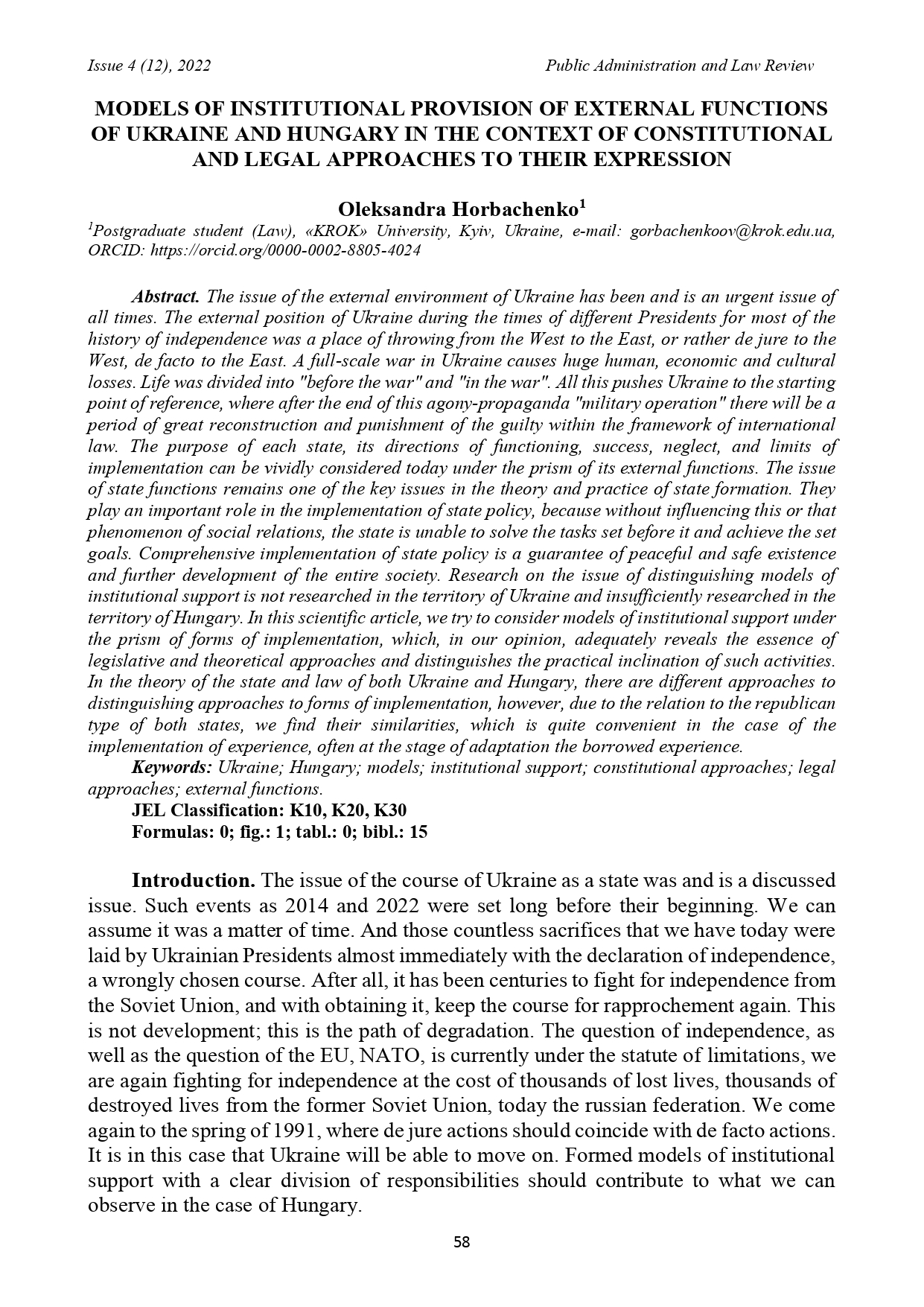MODELS OF INSTITUTIONAL PROVISION OF EXTERNAL FUNCTIONS OF UKRAINE AND HUNGARY IN THE CONTEXT OF CONSTITUTIONAL AND LEGAL APPROACHES TO THEIR EXPRESSION
DOI:
https://doi.org/10.36690/2674-5216-2022-4-58Keywords:
Ukraine, Hungary, models, institutional support, constitutional approaches, legal approaches, external functionsAbstract
The issue of the external environment of Ukraine has been and is an urgent issue of all times. The external position of Ukraine during the times of different Presidents for most of the history of independence was a place of throwing from the West to the East, or rather de jure to the West, de facto to the East. A full-scale war in Ukraine causes huge human, economic and cultural losses. Life was divided into "before the war" and "in the war". All this pushes Ukraine to the starting point of reference, where after the end of this agony-propaganda "military operation" there will be a period of great reconstruction and punishment of the guilty within the framework of international law. The purpose of each state, its directions of functioning, success, neglect, and limits of implementation can be vividly considered today under the prism of its external functions. The issue of state functions remains one of the key issues in the theory and practice of state formation. They play an important role in the implementation of state policy, because without influencing this or that phenomenon of social relations, the state is unable to solve the tasks set before it and achieve the set goals. Comprehensive implementation of state policy is a guarantee of peaceful and safe existence and further development of the entire society. Research on the issue of distinguishing models of institutional support is not researched in the territory of Ukraine and insufficiently researched in the territory of Hungary. In this scientific article, we try to consider models of institutional support under the prism of forms of implementation, which, in our opinion, adequately reveals the essence of legislative and theoretical approaches and distinguishes the practical inclination of such activities. In the theory of the state and law of both Ukraine and Hungary, there are different approaches to distinguishing approaches to forms of implementation, however, due to the relation to the republican type of both states, we find their similarities, which is quite convenient in the case of the implementation of experience, often at the stage of adaptation the borrowed experience.
Downloads
References
Soskin O. (2008). Joining NATO is Ukraine's strategic choice. Institute of Society Transformations. Kyiv. 192 p.
Volynka K. (2003). Theory of the state and law. Tutorial. MAUP. Kyiv. 239 p.
Bandurka O. (2018). Theory of the state and law. Textbook. Kharkiv National University of Internal Affairs. Kharkiv. 416 p.
Samilo H. (2010). Theory of the state and law. Tutorial. education Zaporizhzhia. 348 p.
Vedernikov Yu. (2015). Theory of the state and law: a textbook. Dnipro Lira-LTD. 468 p.
The Constitutional Court of Ukraine. International relations. Retrieved from: https://ccu.gov.ua/storinka-knygy/5225-mizhnarodni-vidnosyny. (application date 11.08.2022).
Kostyuchenko Ya. (2020). A model of institutional support for the implementation of the association agreement between Ukraine and the EU. Enterprise, economy and law. Constitutional right. 1/2020. P.133-137.
The Constitution of Ukraine (Fundamental Law) dated June 28, 1996. No. 30, Art. 141. In the editorial office as of 08/13/2022. URL: https://zakon.rada.gov.ua/laws/show/254%D0%BA/96-%D0%B2%D1%80#Text.
Resolution of the CMU "Regulations on the Ministry of Foreign Affairs" dated March 30, 2016. No. 281. In the editorial office as of 08/13/2022. Retrieved from: https://zakon.rada.gov.ua/laws/show/281-2016-%D0%BF#top.
Henez Botond A jogállam fogalom fejlődése - A dualizmus rendszere. URL: https://www.studocu.com/hu/document/nemzeti-kozszolgalati-egyetem/allam-es-jogelmelet/ii-felev-majt/21305917. (Accessed 14.08.2022).
Magyarország Alaptörvénye (2011. április 25.). URL: https://net.jogtar.hu/jogszabaly?docid=A1100425.ATV. (Accessed 15.08.2022)
182/2022. (V. 24.) Korm. Rendelet a Kormány tagjainak feladat- és hatásköréről. URL: https://net.jogtar.hu/jogszabaly?docid=A2200182.KOR&searchUrl=/gyorskereso%3F3%225A9r%25C5%2591l. (Accessed 15.08.2022).
PETRÉTEI József Hatalommegosztás. URL: https://ijoten.hu/szocikk/alkotmanyjog-hatalommegosztas#block-753. (Accessed 15.08.2022).

Downloads
Published
How to Cite
Issue
Section
License
Copyright (c) 2022 Oleksandra Horbachenko

This work is licensed under a Creative Commons Attribution 4.0 International License.





